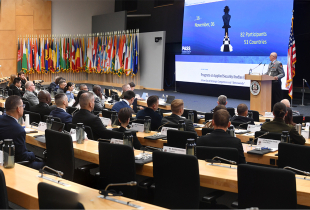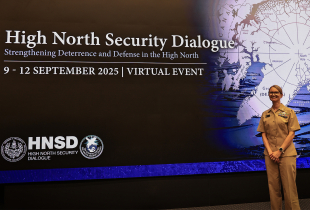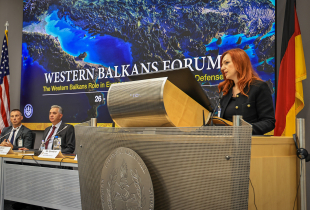
Challenges of Europe’s Southern Flank Analyzed More Closely in New Week-Long Security Seminar Resident Course
By James E. Brooks
Public Affairs Office
George C. Marshall European Center for Security Studies
GARMISCH-PARTENKIRCHEN, Germany (May 13, 2016) - A week-long conference that brought a group of 50 civilian and military officials from 30 nations and seasoned strategy experts to examine the global challenges along Europe’s southern flank and propose new strategies concluded May 13, at the George C. Marshall European Center.
“Developing Strategies to Address Contemporary Security Challenges and the Dissolution of Order on Europe’s Southern Flank,” was the focus of this first-ever seminar at the Marshall Center. The seminar follows shortly behind another Marshall Center first-ever seminar held in January that examined a resurging Russia and its challenges on Europe’s eastern flank.
Course Director Dr. Ralf Roloff stressed the foundations of the seminar in his final remarks to participants on the last day.
“What we learned from the very beginning, very often, is that one begins to ‘admire the problem’ and that implies understanding. But we have to understand what is really going on before we can begin to look at solutions and that’s what this entire week was about,” said Roloff.
Solving migration and the causes of instability along Europe’s southern flank has many world leaders concerned. Among them, former U.S. European Commanding U.S. Air Force Gen. Phillip Breedlove.
“The last time I addressed this committee the security situation in Europe was complex. Since then the situation has only grown more serious and more complicated,” Breedlove said during his Senate Armed Forces Committee testimony last month. “To the south, from the Levant through North Africa, Europe faces the daunting challenge of mass migrations spurred by state instability and state collapse and masking the movements of criminals, terrorists and foreign fighters.”
Among the keynote speakers were U.S. Ambassador David Satterfield, Charge d’Affaires to Egypt; Hellenic Gen. Mikhail Kostarakos, Permanent Chairman of the European Union Military Committee; Ambassador Gabor Iklody, Director of Crisis Management and Planning Directorate of the European External Action Service and Jennifer Gavito, U.S. Consul General Munich. Each shared their personal insight on issues facing the Europe.
Discussions among the experts and participants regarding migration and possible solutions quickly revealed the complexity of the situation. And like cable television news reports proposing answers, most are often disconnected from reality.
“Building fences and making a fortress Europe is certainly not an answer. However, there are large populations in our nations who feel they must be protected and unless they feel they are protected, anti-migrant feelings will grow. We must slow down the influx of migrants. Experts say Europe can receive up to 300,000 migrants per year, not millions,” said Ambassador Iklody during a panel discussion focusing on instruments of stabilization.
Participants delved deeper into the security challenges through smaller group discussions.
“We divided the participants into five seminars representing five different subregions (European Union, U.S., NATO, Middle East and Levant, and North Africa) and we challenged them to look at other policy areas where we can bring about real change. We also asked them the question whether or not a dual policy approach can be put on the table. This is simply the beginning of a conversation,” said Marshall Center Professor of Transnational Security Studies Dr. Graeme Herd.
The response to migration and other transnational threats such as organized crime and terrorism takes more than just a European effort. The Marshall Center’s Seminar on European Security-South also included military and government officials from the Middle East and North Africa.
Marshall Center alumnus Col. Georges Sakr returned to the center from his home in Lebanon where he serves as the commander of training at the Military Academy there. Sakar found the seminar extremely valuable.
“This is a place where many people can come together to understand each other, to look at a problem and discover where we converge and diverge. You have issues going on in the Middle East and in the region. The European point of view is different than the Middle East point of view or North Africa point of view. It’s important that they listen to what we have to say and it’s important to us to know what they are planning. If we want the Middle East wishes and strategies to be implemented, we need to explain to Europe what they are doing wrong and what they are doing right,” said Sakr.
Sakr compared ESS-S to the Marshall Center’s Program on Applied Security Studies he completed in 2010. The seminar was much shorter in length and participants had more to gain with more time.
“You can’t build trust in five days. Trust is built over time and it’s not only built by sharing ideas. But this class does bring us little closer to understanding each other more about the recent issues,” said Sakr.
On the final day of the seminar, the groups shared possible strategies from the perspectives of their respective subregion. There was consensus that no one organization or nation will be able to fix the instability and migration problem along Europe’s southern flank. The seminars’ solutions each echoed the thoughts Ambassador Iklody shared with them.
“If you were to ask me what the EUs unique strength in crisis management is, it is clearly a comprehensive approach--the use of the large tool box from diplomacy, through trade, development assistance, humanitarian assistance, everything including the military. There is no other organization or country who can deploy all these instruments except the EU,” Iklody said.
The George C. Marshall European Center will publish a “Security Insights” paper to share the proposed seminar groups proposed strategies.
“The New Dynamic in the East: Conflicts, Vulnerability and (Dis)Order” captured seminar work from European Security Seminar East held in January and was distributed at the Munich Security Conference.


